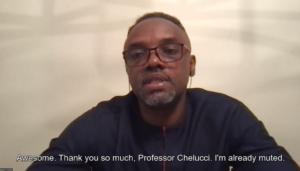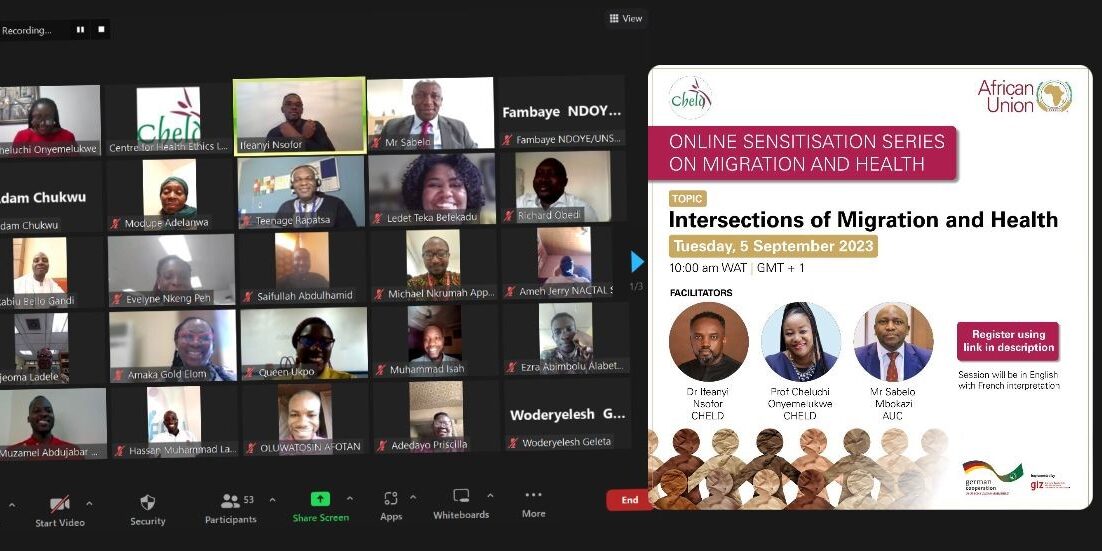Introduction
In the month of September, CHELD commenced activities on the GIZ/AUC project with the online sensitization series on Migration and Health. In partnership with the African Union Commission and with the generous support of Deutsche Gesellschaft für Internationale Zusammenarbeit (GIZ), the Centre for Health Ethics Law and Development (CHELD) organised an Online Sensitisation Series on Migration and Health. The series provides opportunities to explore the intricate relationship between migration and health, addressing critical topics that require urgent attention. The online sensitisation series was introduced as a platform for diverse stakeholders to come together, learn from one another, share experiences, and discuss key issues related to migration and health.

Complexities of Health and Migration
During the first session, the speaker acknowledged the historical cooperation between the AUC and CHELD, while also emphasising the importance of focusing on migration and health within the African context. He also highlighted the AUC’s alignment with EU priorities on access to health for African migrants, which resonate with the African Union’s Agenda 2063, particularly Aspiration 1 – “A prosperous Africa based on inclusive growth and sustainable development,” and Goal A – “A high standard of living, quality of life, and well-being for all citizens.” As a result of the COVID-19 pandemic, it is now clear that the health of migrants is intertwined with the health of the wider population, emphasizing the need to prioritize this topic.
Dr Nsofor led a discussion on the policies needed for migrant health within African Union member states. He encouraged participants to actively engage in the conversation and he started by asking a fundamental question: “What migrant health policy should be developed and implemented by African Union member states?” Participants were allowed to provide up to three policy suggestions each. Key Policy Suggestions by Participants were Universal Health Coverage (UHC), Maternal and Child Health, Health Access, Health services in humanitarian Settings, Basic Health Services, Disability Support, Vaccination, Mental Health Support, Sexual and Reproductive Health and Rights (SRHR), Gender Balance and equity in healthcare services for migrants, Cross-Border Surveillance.

Dr Nsofor then emphasised the importance of considering various features and aspects of migrant health when developing migrant health policies. He stressed the interconnectedness of health and migration, emphasizing that migrants’ health is essential not only for their well-being but also for the host communities they pass through or stay in. He highlighted the need for policies that address the health of migrants, whether they are moving within or outside of Africa. He mentioned that policies for migrant health must consider social determinants of health, such as access to water, sanitation, education, and other basic needs.
Health and Migration Governance in Africa
In the second part of the session, Prof Onyemelukwe emphasised the legal obligations of African Union member states to protect the right to health, including for migrants. She highlighted the importance of ensuring that all individuals, regardless of their migrant status, have the right to non-discrimination and equality when accessing health services. She emphasised that some international legal instruments include provisions that prevent discrimination based on migrant status. Some additional international instruments discussed include the Protocol to Prevent, Suppress, and Punish Trafficking in Persons, Especially Women and Children, the Global Compact for Migration (GCM), the Universal Declaration of Human Rights, ICESCR, Convention on the Elimination of All Forms of Racial Discrimination, Convention on the Rights of the Child, and Convention on the Rights of Persons with Disabilities. The importance of these instruments in guaranteeing the right to health for all individuals, including migrants and refugees, was highlighted.
Prof Onyemelukwe also underscored the various global commitments, including the Sustainable Development Goals (SDGs) intended to promote universal health coverage and well-being for all, without discrimination. She particularly stressed SDG 3 as focusing on universal health coverage for people of all ages.

Suggestions
During the course of the session, various suggestions were offered by the participants on the subject matter. Some of the suggestions made by the participants include:
- Participants highlighted the need for coordination between different ministries and agencies, such as those responsible for health and humanitarian affairs. Effective collaboration is essential to ensure that policies and programs address the complex needs of migrants.
- Healthcare providers should receive training and support to develop cultural competence, enabling them to understand and address the unique needs of migrant populations. Cultural competence can help healthcare workers build trust and rapport with migrants.
- Recognizing the heterogeneity of migrants, participants stressed the importance of tailoring healthcare programs to specific migrant groups. Programs should consider factors such as language, culture, and socioeconomic status.
- Participants discussed the importance of including migrants in healthcare data. They stressed the need to recognize migrants as part of the population when collecting healthcare data and formulating policies. Data should reflect the diverse groups of migrants.
- It was noted that ensuring access to basic healthcare should be seen as a shared responsibility among member states of the African Union and the global community. Providing basic healthcare is a fundamental human right and a duty that transcends borders.
- It was suggested that member countries should explore and implement stronger enforcement mechanisms to ensure that laws and international instruments related to migrant health rights are effectively enforced.
- Participants recommended that frameworks and policies should be more closely aligned with the practical challenges and experiences of migrants to ensure their effectiveness.
- To address the limited awareness among health workers, there was a call for increased training and awareness programs focusing on the rights and needs of migrants.
- The importance of actively encouraging countries to ratify and implement international and regional frameworks was emphasized. This includes sharing best practices and lessons learned among member states.
- It was agreed that dialogues like this session should continue to take place to facilitate the exchange of knowledge and experiences among countries, organizations, and experts.

Conclusion
The session concluded at 12:20 (WAT, GMT+1) with a series of remarks and expressions of gratitude for the insightful discussion on migrant health rights. Participants highlighted the importance of the convening power of the African Union (AU) and the value of such sessions in promoting awareness and collaboration among member states.








